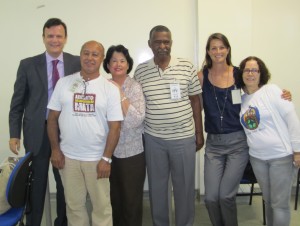Read the Special Edition Brazil July eNewsletter
ADAO had the pleasure of visiting Brazil’s Fundação Oswaldo Cruz (known as FIOCRUZ), a prolific science and technology health institution associated with the Brazilian Ministry of Health in Rio de Janeiro. FIOCRUZ, which has been a major contributor to public health in Latin America for over 100 years, promotes health and social development and disseminates scientific and technical knowledge throughout South America. The institute first became involved in asbestos issues when they were approached by Donna Amèlia, a worker at an asbestos fabric manufacturing plant, in 1995. Amèlia was concerned about her asbestos exposure and coordinated a group of about 100 female workers from her factory to help them seek treatment through FIOCRUZ, thus forming a group that is credited with starting the anti-asbestos movement in Brazil. In 2004, FIOCRUZ started working with exposed workers from Eternit plants who had similar medical concerns. In response to asbestos plant workers, FIOCRUZ conducted asbestos studies in 2002, 2006, and 2008 in order to document the health problems the workers suffered and to learn more about the effects of asbestos exposure.
Vanda D’Acri, a FIOCRUZ social worker and researcher, coordinated ADAO’s visit, where we met with several FIOCRUZ researchers, victims of asbestos exposure that used FIOCRUZ’s resources, and an attorney associated with the anti-asbestos movement. ADAO’s time at FIOCRUZ was extremely enlightening. After D’Acri and her colleague, Maria Blandina Marques dos Santos, provided some background on FIOCRUZ, Jorge and Geraldo, two asbestos victims, shared their experiences with us; their moving stories can be read on ADAO’s Share Your Story page. ADAO also heard about the challenges of pursuing legal compensation for victims in Brazil from attorney Learnardo Amarante.
Everyone present shared a unique insight into the anti-asbestos movement in Brazil. Dos Santos further shed light on the anti-asbestos movement, explaining, “There is a movement here where workers, patients, and researchers work together. It started in Sao Paulo, moved to Rio, and then spread to other locations. Later, FIOCRUZ joined the movement, providing not only medical support, but also spreading awareness about asbestos-related diseases.”
Amarante also detailed the difficulties for asbestos victims in obtaining financial compensation from the employers who exposed them to asbestos. “I have been working with asbestos cases for 20 years in Brazil,” he explained, “We have faced many difficulties in this job. Many workers gave up the right to litigation, accepting unfair compensations without even consulting their lawyer first. Others were heavily pressured to accept settlements. More than 50% of the plaintiffs have died waiting for a trial. However, we are having some success in our work, and the Courts have been awarding fair amounts
Those we met with emphasized the importance of collaboration between sectors, especially given the strength and immoral practices of the asbestos industry. They also noted they were constantly learning more about asbestos and its affects from those around them, and expressed the hope, that we can all work towards a ban of asbestos in Brazil and, ultimately, around the world.
Linda Reinstein’s Social Networks
ADAO Social Networks

